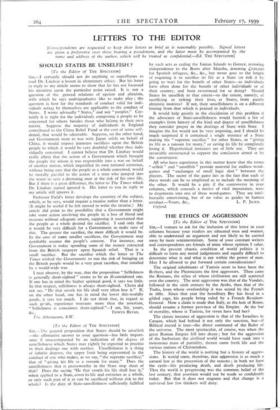LETTERS TO THE EDITOR
[Correspondents are requested to keep their letters as brief as is reasonably possible. Signed letters are given a preference over those bearing a pseudonym, and the latter must be accompanied by the name and address of the author, which will be treated as confidential.—Ed. THE SPECTATOR]
SHOULD STATES BE UNSELFISH ?
[To the Editor of THE SPECTATOR] SIR,—I certainly should not do anything so superfluous as read Dr. Lindsay a lesson in elementary ethics. But his letter in reply to my article seems to show that he has not focussed his attention upon the particular point raised. It is not a question of the general relations of egoism and altruism, with which he says undergraduates like to make play ; the question is how far the standards of conduct valid for indi- viduals acting by themselves are applicable to the conduct of States. I wrote advisedly " States," and not " peoples." Cer- tainly it is right for the individuals composing a people to be concerned for others besides those who belong to their own nation. Suppose the majority of individuals in England contributed to the China Relief Fund at the cost of some self- denial, that would be admirable. Suppose, on the other hand, our Government went to war with Japan solely on behalf of China, it would impose immense sacrifices upon the British people to which it would be very doubtful whether they indi- vidually consented. I cannot believe that Dr. Lindsay would really affirm that the action of a Government which brought the people for whom it was responsible into a war on behalf of another nation, which imperilled its own national existence, without being sure that the people as a whole consented, would be morally parallel to the action of a man who jumped into the water to save a drowning man at the risk of his own life. But if there is a great difference, the letter to The Times which Dr. Lindsay signed ignored it. His letter to you in reply to my article still ignores it.
Professor Field's letter develops the casuistry of the subject, which, as he says, would require a treatise rather than a letter. (It might be useful if he felt moved to write the treatise.) My article did point to the possibility that a Government might take some action involving the people in a loss of blood and treasure without adequate return, supposing it ascertained that the people as a whole desired the sacrifice. I said only that it would be very difficult for a Government to make sure of this. The greater the sacrifice, the more difficult it would be. In the case of some smaller sacrifices, the Government may justifiably assume the people's consent. For instance, our Government is today spending some of the money extracted from the British taxpayer upon Spanish relief. That is a small sacrifice. But the sacrifice which the letter to The Times wished the Government to run the risk of bringing on the British people would be a very great sacrifice, that entailed by a world-wide war.
I may observe, by the way, that the proposition " Selfishness is generally short-sighted " seems to be an ill-considered one. If one has in mind the higher spiritual good, it says too little. In that respect, selfishness is always short-sighted. Christ did not say, " He that saveth his life shall very often lose it." If, on the other hand, one has in mind the lower this-worldly goods, it says too much. I do not think that, in regard to such gcods, experience warrants more than the assertion, " Selfishness is sometimes short-sighted."—I am, Sir, yours, The Athenaeum, S.W.










































 Previous page
Previous page